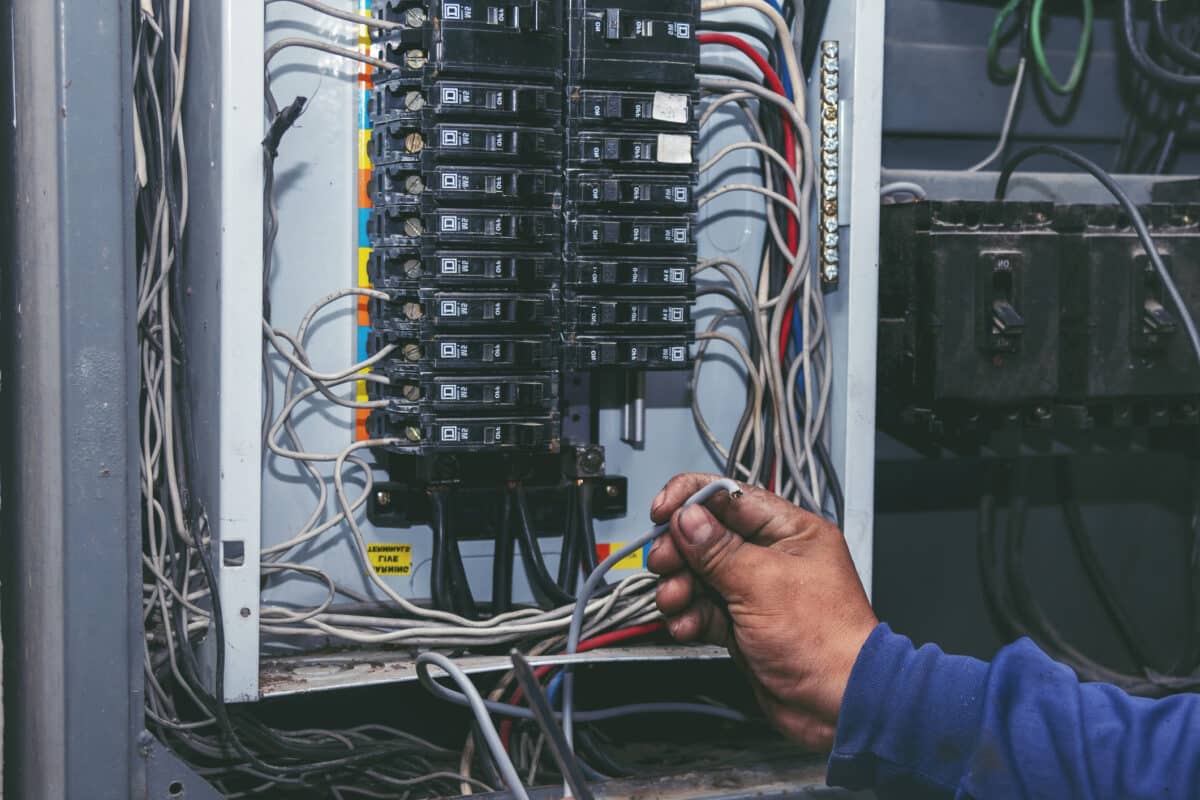The Ultimate Guide to Residential Circuit Management

Understanding the nuances of residential circuit management is crucial for maintaining a safe and efficient home environment. This concept, often overlooked, serves as the backbone for electrical performance in modern homes. By prioritizing effective circuit management, homeowners in Florence, SC, and beyond can significantly reduce the risk of electrical mishaps. It’s not just about safety; it’s also about optimizing the functionality of your home’s electrical system.
In cities like Woodland Park, SC, where residential communities continue to grow, the demand for knowledgeable electrical service providers like Mister Sparky is on the rise. The importance of residential circuit management cannot be understated, especially in areas experiencing rapid development. It ensures that electrical systems can handle the demands of today’s technology-heavy households. From smart home devices to electric vehicles, the need for robust circuit management has never been greater.
Meanwhile, in Winona, SC, the focus on energy efficiency and sustainability brings an additional layer to the importance of residential circuit management. By properly managing circuits, homeowners can not only safeguard their homes but also contribute to broader environmental goals. Efficient circuit management leads to reduced energy waste, aligning with the growing trend towards greener living practices.
As we dive deeper into the ultimate guide to residential circuit management, remember that this is about enhancing safety, improving electrical performance, and contributing to a sustainable future. Whether you’re in Florence, Woodland Park, or Winona, the principles of effective circuit management remain the same. It’s a crucial aspect of home maintenance that, when done correctly, offers peace of mind and a safer, more efficient living space.
Understanding the Basics of Residential Circuit Management
Understanding the basics of residential circuit management is essential for anyone looking to enhance their home’s electrical safety and performance. This foundational knowledge helps homeowners identify potential issues before they escalate into serious problems. For instance, knowing how to recognize an overloaded circuit can prevent the risk of electrical fires. This is particularly important in Woodland Park, SC, where the blend of old and new homes requires a keen eye on electrical health.
Learning about the different types of circuits and their roles within the home is another crucial aspect. Each circuit is designed to serve a specific area or type of appliance. This specialization ensures that electrical loads are properly distributed, preventing overloads and short circuits. In Winona, SC, where energy efficiency is a priority, understanding circuit functions can also lead to more sustainable living practices.
Moreover, regular inspection and maintenance of your home’s electrical system are vital components of residential circuit management. Simple actions like checking for loose outlets or frayed wires can significantly enhance your home’s electrical safety. These preventive measures are especially important in areas with older housing stock, where electrical systems might not have been updated to meet current standards.
Finally, embracing modern technology can play a significant role in optimizing residential circuit management. Smart home devices, for example, offer innovative ways to monitor and manage your home’s electrical usage more efficiently. By integrating these technologies, homeowners in Florence, SC, and beyond can enjoy a safer, more energy-efficient living environment. This approach not only improves electrical performance but also contributes to a more sustainable future.

Photo from iStock – Credit: howtogoto
Identifying Common Circuit Issues in Homes
Identifying common circuit issues in homes is a critical step in residential circuit management. It’s essential for homeowners in Florence, SC, to recognize signs of electrical problems early. These can range from frequent breaker trips to flickering lights. Catching these issues promptly can prevent more serious electrical hazards and ensure the safety of your home.
In Woodland Park, SC, one common issue is outdated wiring that struggles to support modern electrical demands. Homes with aging electrical systems may experience more frequent circuit overloads. This not only risks damaging appliances but also increases the risk of electrical fires. Upgrading your home’s wiring is a proactive step towards better circuit management and safety.
Another issue often overlooked is the misuse of extension cords and power strips in Winona, SC. Relying heavily on these as permanent solutions can lead to overloaded circuits. It’s important to use them sparingly and consider adding more outlets to handle your electrical needs safely. This approach aligns with effective residential circuit management by distributing the electrical load more evenly.
Lastly, water exposure to electrical systems can cause significant issues, from short circuits to potential electrocution. Regularly inspect areas prone to moisture, especially in kitchens and bathrooms. Ensuring that GFCI outlets are installed and functioning properly can add an extra layer of protection. This practice is a key component of residential circuit management, safeguarding your home against common electrical problems.
The Role of Circuit Breakers and Fuses in Safety
Circuit breakers and fuses play a crucial role in residential circuit management, acting as the first line of defense against electrical overloads and short circuits. When a circuit draws too much power, these devices swiftly cut off the electrical flow, preventing potential damage to appliances and reducing the risk of fires. This protective measure is essential in homes across Florence, SC, where the blend of modern and older electrical systems requires constant monitoring to ensure safety. By effectively managing these components, homeowners can maintain a safe electrical environment.
In Woodland Park, SC, the proper selection and maintenance of circuit breakers and fuses are key to optimizing residential circuit management. Choosing the right amperage and type for your home’s needs helps prevent electrical issues before they arise. Regular checks and replacements of worn-out fuses and breakers further enhance this protection. This proactive approach not only safeguards the home but also improves the overall efficiency of the electrical system.
Moreover, understanding the difference between circuit breakers and fuses is vital for homeowners in Winona, SC. While both serve similar protective functions, they operate in distinct ways. Circuit breakers can be reset after tripping, whereas fuses must be replaced. This knowledge allows homeowners to make informed decisions about their electrical systems, ensuring they are adequately protected against overloads and short circuits.
Finally, integrating modern electrical safety devices, such as arc fault circuit interrupters (AFCIs) and ground fault circuit interrupters (GFCIs), complements the function of circuit breakers and fuses. These advanced devices offer an additional layer of protection by detecting dangerous electrical conditions that traditional breakers and fuses might not catch. For residents in Florence, SC, and beyond, incorporating these technologies into their residential circuit management plans enhances safety and performance, aligning with the latest electrical standards and practices.
Tips for Optimizing Your Home’s Electrical Load
Managing your home’s electrical load effectively is key to optimizing residential circuit management. This involves knowing how much power your household appliances and devices need and ensuring they’re distributed evenly across circuits. In Florence, SC, where households vary in size and electrical demand, this balance is crucial to prevent overloads and maintain efficiency. By understanding your electrical needs, you can keep your system running smoothly and safely.
In Woodland Park, SC, homeowners can benefit from mapping their home’s electrical system. This means identifying which outlets and appliances are connected to each circuit. This simple step can help avoid overloading circuits by spreading high-demand appliances across different circuits. It also makes troubleshooting easier when problems arise, as you’ll know exactly where to look.
Regularly assessing your household’s electrical consumption is another effective strategy in Winona, SC. As new devices are added to your home, the electrical load changes. Periodically reviewing what’s plugged in and where can prevent circuits from becoming overwhelmed. This proactive approach supports sustainable residential circuit management by adapting to your home’s evolving electrical needs.
Lastly, consider consulting with a professional electrician to review and possibly upgrade your electrical panel. This is especially relevant for older homes in Florence, SC, that might not have been designed for today’s electrical demands. An upgraded electrical panel can handle more circuits, providing a more robust solution for managing your home’s electrical load. This step not only enhances safety but also prepares your home for future electrical needs.
Residential Circuit Management Best Practices
Adopting best practices in residential circuit management is essential for maintaining a safe and efficient home. In Florence, SC, homeowners can start by creating a detailed plan for their electrical system. This plan should include regular inspections to identify and address any potential issues early. By doing so, they ensure their home’s electrical system remains in top condition, preventing unexpected failures and enhancing safety.
In Woodland Park, SC, one effective strategy is to invest in quality surge protectors for high-value electronics. Surge protectors help manage unexpected spikes in electrical voltage, safeguarding sensitive devices from damage. This practice not only extends the lifespan of your electronics but also contributes to the overall safety of your home’s electrical system. It’s a simple yet effective step towards better residential circuit management.
Meanwhile, residents in Winona, SC, can improve their circuit management by labeling their home’s electrical panel. Clear labels make it easier to identify which breaker controls each part of the home. This not only simplifies troubleshooting during electrical issues but also enhances safety during emergencies. Knowing exactly where to turn off power in a specific area can prevent accidents and save lives.
Lastly, educating all household members about basic electrical safety and residential circuit management is crucial. Everyone should know how to safely reset a tripped breaker and when to call a professional electrician. This collective awareness ensures that minor issues can be addressed promptly, preventing them from escalating into major problems. It’s a collective effort that contributes to a safer, more efficient home environment.
The Impact of Poor Circuit Management on Home Safety
Understanding the consequences of neglecting residential circuit management is crucial for homeowners in Florence, SC. Poor management can lead to frequent electrical failures, disrupting daily life and causing frustration. These failures not only inconvenience but also pose a significant safety risk, as they can be precursors to more severe problems. Identifying and addressing these issues early on prevents potential hazards and ensures a smoothly running electrical system.
In Woodland Park, SC, the impact of inadequate circuit management extends beyond immediate safety concerns. Over time, the stress on electrical components from constant overloading can lead to wear and tear, shortening their lifespan. This not only increases the cost of maintenance and replacements but also risks the integrity of your home’s electrical infrastructure. Properly managing your circuits helps avoid these unnecessary expenses and keeps your electrical system in optimal condition.
Residents in Winona, SC, should be aware that poor residential circuit management can significantly increase the risk of electrical fires. Overloaded circuits, faulty wiring, and neglected maintenance are prime contributors to this risk. By ensuring that circuits are not overloaded and that the electrical system is regularly inspected, homeowners can greatly reduce the likelihood of such dangerous situations. This proactive approach is essential for maintaining a safe living environment.
Finally, the overall efficiency of your home’s electrical system heavily depends on effective residential circuit management. When circuits are properly managed, they distribute power evenly, preventing overloads and ensuring that every appliance operates at its best. This not only enhances the performance of your electrical system but also contributes to energy conservation. By prioritizing circuit management, homeowners can enjoy a safer, more efficient home while contributing to broader environmental sustainability efforts.
How to Conduct a Basic Home Circuit Inspection
Conducting a basic home circuit inspection is a vital step in residential circuit management, ensuring both safety and efficiency in your electrical system. Start by turning off all appliances to prevent any electrical load during the inspection. This precaution makes it easier to spot issues without the interference of current usage. Homeowners in Florence, SC, can perform this initial step to prepare their homes for a thorough inspection.
Next, inspect your electrical panel for any signs of wear or damage, such as rust or loose connections. If you notice anything unusual, it’s crucial to address these issues immediately to avoid potential hazards. Residents in Woodland Park, SC, should pay special attention to the condition of their circuit breakers, ensuring they are not only intact but also properly labeled. This step aids in quickly identifying and resolving any electrical issues that may arise.
In addition to the electrical panel, check all outlets and switches in your home for signs of damage, such as discoloration or warmth to the touch. These symptoms could indicate underlying problems that require professional attention. For those living in Winona, SC, employing a voltage tester can help verify the proper functioning of outlets, enhancing the overall safety of your home’s electrical system.
Finally, ensure that all GFCI outlets function correctly by pressing the test button. These outlets are crucial for preventing shock in areas prone to moisture, like kitchens and bathrooms. Conducting this simple test is an easy yet effective component of residential circuit management, safeguarding your home against electrical issues. By following these steps, homeowners can maintain an efficient and safe electrical system, contributing to the well-being of their living environment.
Choosing the Right Professional for Your Circuit Needs
When it comes to residential circuit management, selecting the right professional is crucial. Homeowners in Florence, SC, should look for electricians with a strong track record in electrical safety and efficiency. Experience and expertise matter, as they ensure your home’s electrical system is in capable hands. It’s not just about fixing current issues but also about preventing future problems.
In Woodland Park, SC, finding an electrician who understands local regulations and building codes is essential. This knowledge is vital for ensuring that any work done on your home meets the required standards. A professional with this insight can also advise on potential upgrades or changes to enhance your home’s electrical performance. Their guidance can make a significant difference in your residential circuit management efforts.
Residents of Winona, SC, should consider the importance of ongoing support and maintenance when choosing an electrical service provider. A good professional doesn’t just solve the problem at hand but also offers solutions for maintaining your electrical system’s health over time. This approach can help you avoid unexpected issues and keep your home’s circuits running smoothly.
Finally, communication and transparency are key qualities to look for in an electrician. You want someone who will explain the work needed in a way that’s easy to understand. This ensures you’re informed about your home’s electrical needs and the steps being taken to address them. A professional who values customer service and clarity will make the process of managing your home’s circuits much easier.

Photo from iStock – Credit: tomap49
Frequently Asked Questions
What is residential circuit management?
Residential circuit management involves overseeing and organizing the electrical circuits in a home. It ensures that electricity flows safely and efficiently to every room. By managing circuits properly, homeowners can avoid overloads and potential hazards. This practice also helps in maintaining optimal electrical performance throughout the property.
How do you identify a circuit overload?
Identifying a circuit overload is crucial in residential circuit management. Look for signs like frequent breaker trips or flickering lights. Warm or discolored wall plates also indicate an issue. These symptoms suggest that your home’s electrical circuits are working beyond their capacity, needing immediate attention to prevent potential hazards.
Best practices for circuit breaker maintenance?
To keep your home safe and electricity running smoothly, regular circuit breaker maintenance is key. Start by ensuring they’re clean and free from dust. Test them every few months to confirm they trip and reset correctly. This simple routine is a cornerstone of effective residential circuit management, safeguarding against electrical issues.
What tools are essential for residential circuit management?
For effective residential circuit management, certain tools are indispensable. A multimeter helps measure voltage, current, and resistance, ensuring circuits operate safely. Circuit testers are crucial for identifying electrical faults and confirming proper operation. An insulated screwdriver set allows for safe adjustments and repairs. Lastly, a flashlight supports visibility during inspections or when working in dimly lit areas, making it easier to maintain your home’s electrical system.
How often should circuit inspections occur?
Experts recommend conducting circuit inspections at least once every three years. This routine ensures your home’s electrical system remains in top condition. Regular checks help identify potential issues early, preventing costly repairs. For optimal residential circuit management, consider more frequent inspections if your home is older or experiences frequent electrical problems.















